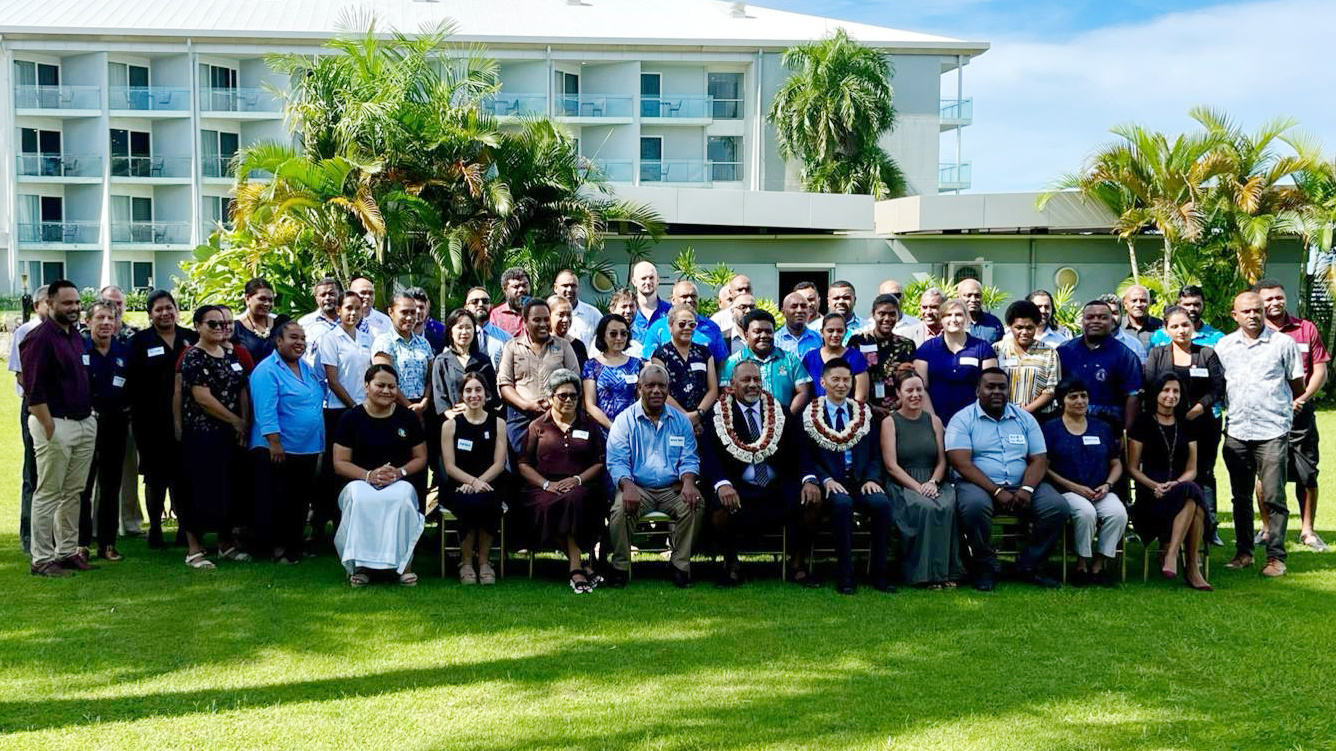Early Warning Systems Project Receives Strong Support
March 1, 2024

Participants of the Early Warning System technical workshop with FIji's Minister for Rural and Maritime Development and Disaster Management, the Honorable Sakiasi Ditoka and Mr. Iori Kato, Acting UN Resident Coordinator for Fiji.
Suva, Fiji – Fiji Government representatives, United Nations (UN) agencies and other key stakeholders convened at the Grand Pacific Hotel for the past two days, to lead an important initiative aimed at strengthening Early Warning Systems (EWS) in Fiji.
Spearheaded by the United Nations Development Programme (UNDP) Pacific Office in Fiji, the core objective of the initiative is to develop a Green Climate Fund (GCF) proposal that will address challenges and improve the effectiveness of Fiji’s EWS.
Despite the acknowledged efficacy of EWS in mitigating disasters, global deficiencies persist, particularly in translating warnings into timely actions. In response to this pressing need, the Early Warning for All (EW4All) initiative was launched by the United Nations Secretary-General in 2022, with its comprehensive Executive Action Plan revealed at COP27.
In his opening address, Minister for Rural and Maritime Development and Disaster Management, the Honorable Sakiasi Ditoka, emphasized the pressing need for Pacific Island Countries to confront the dual challenges of frequent natural hazards and limited risk management capacity.
With millions affected and significant economic losses incurred, Minister Ditoka stressed the imperative of integrating risk mitigation measures into development planning to alleviate vulnerability on a global scale. Highlighting Fiji's leadership in the EW4All initiative and the escalating impacts of climate change on natural disasters, he stressed the importance of inclusive community engagement and the incorporation of indigenous knowledge systems into modern early warning strategies.
Minister Ditoka also issued a call to action, urging collective commitment to the project.
“The Advancing Early Warning for All project is more than just a project; it's a commitment to the safety and well-being of every Fijian. Through our collective efforts, we can ensure that our nation is better prepared, more resilient, and capable of thriving in the face of adversity,” he stated.
Expressing UN support, Mr. Iori Kato, Acting UN Resident Coordinator for Fiji, affirmed the commitment to bolster Fiji's efforts in advancing multi-hazard early warning systems. He outlined the UN's dedication to providing technical and financial assistance for the project's success.
On day two of the event, Mr. Isoa Talemaibua, Permanent Secretary for the Ministry of Rural and Maritime Development and Disaster Management, emphasized the importance of empowering individuals to respond to early warnings through education and capacity building.
Echoing this sentiment, Ms. Yemesrach Workie, Deputy Resident Representative of UNDP Pacific Office in Fiji, stressed the necessity of inclusivity and equality in the proposal's development, ensuring the needs of marginalized groups are addressed.
Fiji's selection among seven countries for coordinated support under the EW4All initiative marks a significant step towards enhancing climate information services and establishing a people-centered Multi-Hazard Early Warning System. This system will prioritize vulnerable communities, including persons with disabilities, women, children, and ethnic minorities.
The EW4All framework is built on four fundamental pillars:
• Pillar 1: Disaster Risk Knowledge
• Pillar 2: Observations and Forecasting
• Pillar 3: Dissemination and Communication
• Pillar 4: Preparedness and Response
These pillars, along with the imperative of a multi-hazard, end-to-end, and people-centered approach, are pivotal in fortifying EWS effectiveness. Moreover, recognizing the diverse impacts of disasters and climate change, an intersectional approach is advocated for inclusivity and equity.
Facilitated by the UNDP, GCF and National Disaster Management Office, the technical working group workshop was attended by representatives of the Rural and Maritime Development and Disaster Management Ministry, the Fiji Meteorological Service, United Nations Office for the Disaster Risk Reduction, the World Meteorological Organization, the International Telecommunication Union and other partners including IFRC and Fiji Red Cross.
For further media enquiries please contact:
Risiate Biudole, Communications Analyst, UNDP Pacific Office in Fiji. (E) risiate.biudole@undp.org

 Locations
Locations


